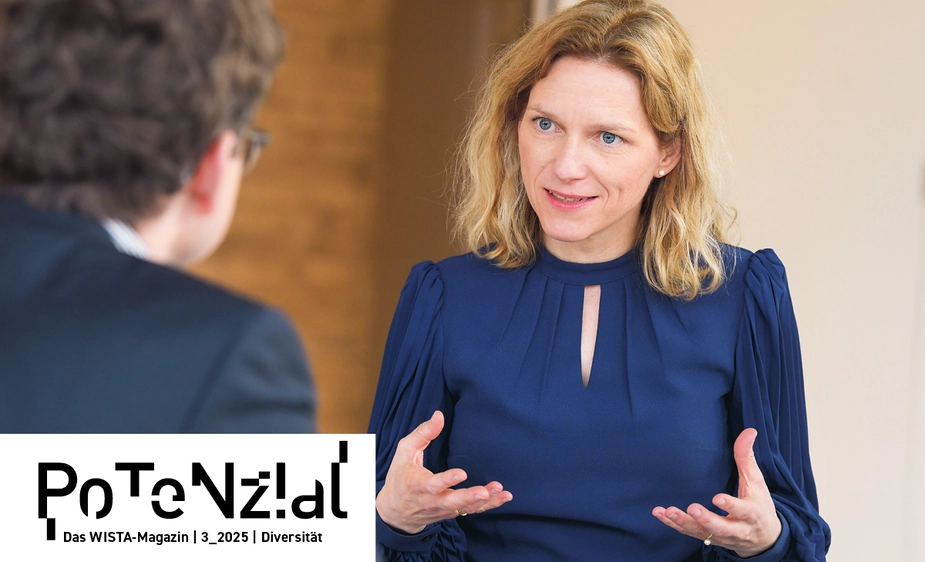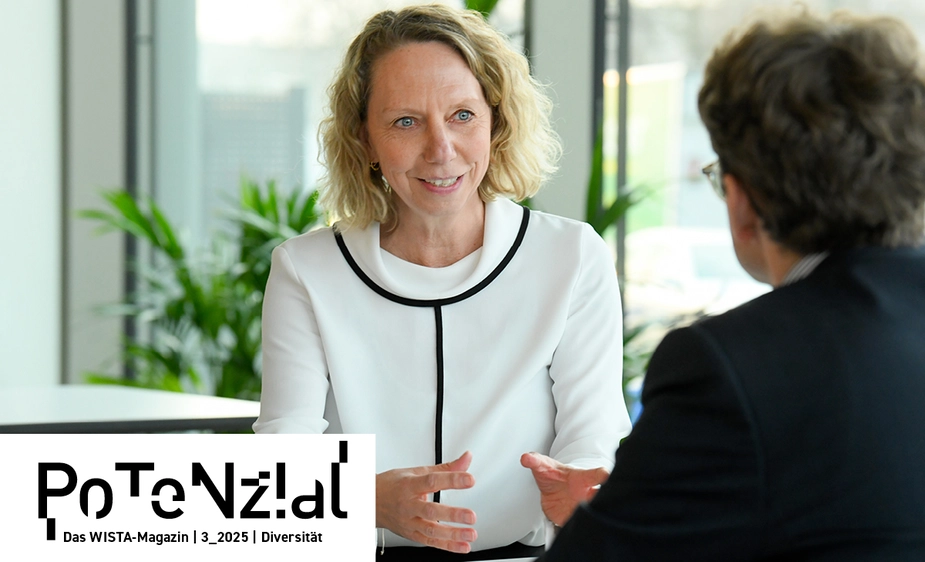Diversity is a big strength for businesses – when it’s practiced in everyday culture
In conversation with Anja Dargel, General Representative at Berliner Sparkasse, and Bessie Fischer-Bohn, Head of HR at WISTA Management GmbH
WISTA is again hosting the Diversity Conference Adlershof. Why is this an important topic?
Bessie Fischer-Bohn: We offer a framework for sustainable economic growth at Adlershof Technology Park. For a long time, this meant developing infrastructure, building roads, establishing technology centres. We have now shifted our strategy and placed people at the heart of our efforts. They work to create innovation, they research, they start companies. This is particularly successful in diverse teams. Add to that the shortage of skilled workers, and the question becomes: What can we offer to make Adlershof an attractive place to work—and to help companies position themselves as attractive employers? What do we need in order to lead and work effectively with diverse teams? That’s how the issue of diversity came into focus—and there is a great interest in it.
The savings bank Berliner Sparkasse supports the conference. You also seem to think there is some catching-up to do. Why?
Anja Dargel: We’re very committed to pushing this topic forward. We see diversity as an opportunity—something that’s particularly evident here in Berlin. The city is international and appeals to people from all kinds of backgrounds. Diversity is practiced here every day. It’s not always easy, but, in the end, everyone benefits from it.
What can the Technology Park Adlershof learn from Berliner Sparkasse in terms of diversity?
Dargel: It’s an issue that cannot be addressed on the side—it needs to be anchored in strategy. This means setting goals and tracking progress. To us, for example, equal participation in the workplace—at all levels—for both women and men is an important issue. We aimed to have 40 percent of leadership roles filled by women by 2027. We ended up reaching that goal by 2023 and are currently at 42 percent on the second and third management tiers. As Berliner Sparkasse, we want to be as diverse as our customers. Our hiring reflects that, too. Every year, 100 young people come wanting to work with us. When we ask them about their family backgrounds, the result is quite literally a colourful world map, with flags planted across many regions. They speak all kinds of languages—and that’s clearly a strength for us.
WISTA has made a visible commitment to equal opportunities. What are the biggest hurdles?
Fischer-Bohn: Many companies are experiencing a generational shift. The more women take on responsibility and do so successfully, the more appealing that path becomes for other women.
But my focus isn’t solely on gender equality. Diversity has many dimensions. Social background, for example, is very important to us. How can we inspire students from less academically oriented families to pursue careers in STEM? Inclusion is also important. We at the Technology Park Adlershof know little about whether we’re attractive to people with visible or invisible disabilities, and how companies can win them over. That’s something we would like to change. For this reason, the conference is structured the way it is: Offerings for many dimensions of diversity, including with lectures, workshops, and opportunities for exchange.
Neurodiversity is another topic. This refers to people who have autism, ADHD, or dyslexia, among other things.
Fischer-Bohn: The number of people unable to work due to mental health conditions continues to rise. These issues are connected: People are more likely to experience mental strain when they’re under pressure to “fit in” at work. If leaders are trained to pay closer attention, it helps.
You mean acknowledging individual traits helps keep people motivated?
Fischer-Bohn: Yes. We want to raise awareness that employees are different and that these differences should be accepted. I believe that it creates real advantages for companies, helping them attract, retain, and develop more people.
Ms. Dargel, what has your experience been in this area?
Dargel: We signed an inclusion agreement in 2023. For instance, we have employees with hearing impairments, and it’s completely normal for a sign language interpreter to be present at company meetings. This year, we’re also offering the opportunity to learn sign language to the colleagues of a deaf employee.
Does diversity also refer to the age of employees?
Dargel: Oh, absolutely, it’s a major topic. Especially now that we’re actively hiring career changers between the ages of 20 and 60, who bring very different experiences compared to traditional bank trainees. I can very much recommend holding a “generational workshop”.
What’s does that refer to?
Dargel: We first tried this in 2016, bringing together 60 people for a whole day. For that one day, everyone—from the apprentice to the chairperson of the board—addressed each other informally, using first names. We split them into so-called mix max teams, ensuring maximum diversity in each group. They jointly tackled challenges using a design thinking approach, and it worked beautifully. We now use the max-mix principle in other areas too, like working groups for sustainability. Since then, we have introduced this first-name culture across the company.
Ms. Fisher-Bohn, what’s your experience with generational differences?
Fischer-Bohn: Of course, that plays a role for us as well. It’s important to take a closer look at the situation—not just to avoid conflict but, ideally, to highlight how employees can learn from one another. We regularly hold team days and bring in team coaches to help strengthen how people work together. This requires everyone to step out of their comfort zone. And that’s a challenge for every generation.
What do you hope participants will take away from the conference?
Fischer-Bohn: I hope they leave with ideas, tools, and practical approaches to advance the topic of diversity—and to make it work for the benefit of their companies.
Dargel: Big slogans on paper won’t get us far. We need to practice it in our everyday culture. I hope participants walk away with plenty of inspiration for how to do just that.
Ralf Nestler for Potenzial
- Diversity at Berliner Sparkasse (in German)
- Diversity Conference Adlershof – WISTA Management GmbH (in German)

